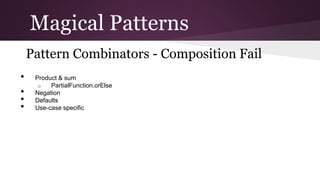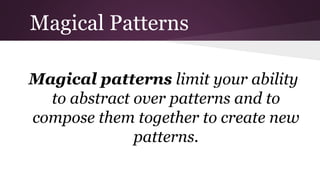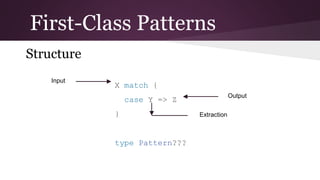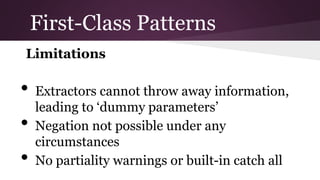First-Class Patterns
- 1. First-Class Patterns John A. De Goes - @jdegoes Frontier Developers, February 26
- 2. Agenda ● ● ● ● ● ● Intro Pattern Matching 101 First-Class-ness 101 Magical Patterns First-Class Patterns Exercises
- 3. Intro Pattern Matching ● Divides a (possibly infinite) set of values into a discrete number of cases, where each case can be handled in a uniform way ● “if” on steroids ○ Sometimes strictly more powerful (e.g. Haskell)
- 4. Intro - Examples -- sign of a number sign x | | | x > 0 x == 0 x < 0 = = = 1 0 -1 -- take the first n elements from a list take take take 0 _ n _ [] (x:xs) = = = [] [] x : take (n-1) xs -- generate some javascript valueToJs valueToJs valueToJs valueToJs ... :: Options -> ModuleName -> Environment -> Value -> JS _ _ _ (NumericLiteral n) = JSNumericLiteral n _ _ _ (StringLiteral s) = JSStringLiteral s _ _ _ (BooleanLiteral b) = JSBooleanLiteral b
- 5. Intro - Examples sealed trait Level case object Level1 extends Level case object Level2 extends Level sealed trait Title case object DBAdmin extends Title case class SWEngineer(level: Level) extends Title case class Employee(manager: Option[Employee], name: String, title: Title) val employees = ??? val selfManagedLevel2Engineers = employees.collect { case Employee(None, name, SWEngineer(Level2)) => name }
- 6. Pattern Matching 101 Filter Does it have the structure I want? [Yes/No] If so, extract out the pieces that are relevant to me. Extract
- 7. Pattern Matching 101 -- take the first n elements from a list take 0 _ = [] take _ [] = [] take n (x:xs) = x : take (n-1) xs Filter - does it have non-empty list structure? Extract - Give me ‘head’ and ‘tail’
- 8. Pattern Matching 101 Products Sums case class Employee( sealed trait Title manager: Option[Employee], name: String, title: case object DBAdmin extends Title terms Title case class SWEngineer(level: Level) extends Title ) class Account { interface Shape { } ... class Rect extends Shape { … } public Account(BigDecimal balance, User holder) { class Ellipse extends Shape { … } ... } } class Pentagon extends Shape { … } terms
- 9. First-Class-ness 101 data Maybe a = Nothing | Just a deriving (Eq, Ord) class Person { public Person(String name, int age) { ... } }
- 10. First-Class-ness 101 Magic interferes with your ability to abstract and compose.
- 11. Magical Patterns Ordinary Duplication sealed object … case case trait Provenance Provenance { class Either(left: Provenance, right: Provenance) extends Provenance class Both(left: Provenance, right: Provenance) extends Provenance def allOf(xs: Seq[Provenance]): Provenance = { if (xs.length == 0) Unknown else if (xs.length == 1) xs.head else xs.reduce(Both.apply) } def anyOf(xs: Seq[Provenance]): Provenance = { if (xs.length == 0) Unknown else if (xs.length == 1) xs.head else xs.reduce(Either.apply) } }
- 12. Magical Patterns Factoring sealed object case case case case case trait Provenance Provenance { object Unknown extends Provenance object Value extends Provenance class Relation(value: SqlRelation) extends Provenance class Either(left: Provenance, right: Provenance) extends Provenance class Both(left: Provenance, right: Provenance) extends Provenance def allOf(xs: Seq[Provenance]): Provenance = reduce(xs)(Both.apply) def anyOf(xs: Seq[Provenance]): Provenance = reduce(xs)(Either.apply) private def reduce(xs: Seq[Provenance])( f: (Provenance, Provenance) => Provenance): Provenance = { if (xs.length == 0) Unknown else if (xs.length == 1) xs.head else xs.reduce(f) } }
- 13. Magical Patterns Factoringz sealed object case case case case case trait Provenance Provenance { object Unknown extends Provenance object Value extends Provenance class Relation(value: SqlRelation) extends Provenance class Either(left: Provenance, right: Provenance) extends Provenance class Both(left: Provenance, right: Provenance) extends Provenance private def strict[A, B, C](f: (A, B) => C): (A, => B) => C = (a, b) => f(a, b) val BothMonoid = Monoid.instance(strict[Provenance, Provenance, Provenance](Both.apply), Unknown) val EitherMonoid = Monoid.instance(strict[Provenance, Provenance, Provenance](Either.apply), Unknown) def allOf(xs: List[Provenance]): Provenance = Foldable[List].foldMap(xs)(identity)(BothMonoid) def anyOf(xs: List[Provenance]): Provenance = Foldable[List].foldMap(xs)(identity)(EitherMonoid) }
- 14. Magical Patterns Toxic Duplication - Abstraction Fail val Add = Mapping( "(+)", "Adds two numeric values" NumericDomain, , (partialTyper { case Type.Const(Data.Number(v1)) :: v2 :: Nil if (v1.signum == 0) => v2 case v1 :: Type.Const(Data.Number(v2)) :: Nil if (v2.signum == 0) => v1 case Type.Const(Data. Int(v1)) :: Type.Const(Data. Int(v2)) :: Nil => Type.Const(Data. Int(v1 + v2)) case Type.Const(Data.Number(v1)) :: Type.Const(Data.Number(v2)) :: Nil => Type.Const(Data.Dec(v1 + v2)) }) ||| numericWidening )
- 15. Magical Patterns Pattern Combinators - Composition Fail ● Product & sum ○ PartialFunction.orElse ● Negation ● Defaults ● Use-case specific
- 16. Magical Patterns Magical patterns limit your ability to abstract over patterns and to compose them together to create new patterns.
- 17. First-Class Patterns First-class patterns are built using other language features so you can abstract and compose them.
- 18. First-Class Patterns Haskell Example ex4 :: Either (Int,Int) Int -> Int ex4 a = match a $ (1+) <$> (left (pair var (cst 4)) ->> id <|> right var ->> id) <|> left (pair __ var) ->> id http://hackage.haskell.org/package/first-class-patterns
- 19. First-Class Patterns “For the rest of us” X match { case Y => Z } type Pattern???
- 20. First-Class Patterns Structure Input X match { Output case Y => Z } type Pattern??? Extraction
- 21. First-Class Patterns One ‘Option’ Input X match { Output case Y => Z } Extraction type Pattern[X, Z] = X => Option[Z]
- 22. First-Class Patterns Basic Patterns def some[A, B](p: Pattern[A, B]): Pattern[Option[A], B] = _.flatMap(p) def none[A, B]: Pattern[A, B] = Function.const( None) def k[A](v0: A): Pattern[A, A] = v => if (v == v0) Some(v0) else None def or[A, B](p1: Pattern[A, B], p2: Pattern[A, B]): Pattern[A, B] = v => p1(v).orElse(p2(v)) scala> or(none, some(k( 2)))(Some(2)) res3: Option[Int] = Some(2) https://gist.github.com/jdegoes/9240971
- 23. First-Class Patterns - JS And Now in JavaScript….Because http://jsfiddle.net/AvL4V/
- 24. First-Class Patterns Limitations ● Extractors cannot throw away information, leading to ‘dummy parameters’ ● Negation not possible under any circumstances ● No partiality warnings or built-in catch all
- 25. Exercises 1. Define a Pattern Combinator to Fix: val Add = Mapping( "(+)", "Adds two numeric values" NumericDomain, , (partialTyper { case Type.Const(Data.Number(v1)) :: v2 :: Nil if (v1.signum == 0) => v2 case v1 :: Type.Const(Data.Number(v2)) :: Nil if (v2.signum == 0) => v1 case Type.Const(Data. Int(v1)) :: Type.Const(Data. Int(v2)) :: Nil => Type.Const(Data. Int(v1 + v2)) case Type.Const(Data.Number(v1)) :: Type.Const(Data.Number(v2)) :: Nil => Type.Const(Data.Dec(v1 + v2)) }) ||| numericWidening ) EASY
- 26. Exercises 2. Define ‘Pattern’ and some core patterns in the language of your choice EASY
- 27. Exercises 3. Define an ‘And’ pattern that requires both inputs match EASY
- 28. Exercises 4. Define an alternate definition of pattern (along with a few core patterns) that permits pattern negation 4.b Optional: Use this to allow catch-alls MODERATE
- 29. Exercises 5. Define an alternate definition of pattern (along with a few core patterns) that permits extractors to throw away information HARD
- 30. THANK YOU First-Class Patterns John A. De Goes - @jdegoes Frontier Developers, February 26




![Intro - Examples
-- sign of a number
sign x |
|
|
x > 0
x == 0
x < 0
=
=
=
1
0
-1
-- take the first n elements from a list
take
take
take
0
_
n
_
[]
(x:xs)
=
=
=
[]
[]
x : take (n-1) xs
-- generate some javascript
valueToJs
valueToJs
valueToJs
valueToJs
...
:: Options -> ModuleName -> Environment -> Value -> JS
_ _ _ (NumericLiteral n) = JSNumericLiteral n
_ _ _ (StringLiteral s) = JSStringLiteral s
_ _ _ (BooleanLiteral b) = JSBooleanLiteral b](https://image.slidesharecdn.com/first-classpatterns-140226182000-phpapp02/85/First-Class-Patterns-4-320.jpg)
![Intro - Examples
sealed trait Level
case object Level1 extends Level
case object Level2 extends Level
sealed trait Title
case object DBAdmin extends Title
case class SWEngineer(level: Level) extends Title
case class Employee(manager: Option[Employee], name: String, title: Title)
val employees = ???
val selfManagedLevel2Engineers = employees.collect {
case Employee(None, name, SWEngineer(Level2)) => name
}](https://image.slidesharecdn.com/first-classpatterns-140226182000-phpapp02/85/First-Class-Patterns-5-320.jpg)
![Pattern Matching 101
Filter
Does it have the structure I
want? [Yes/No]
If so, extract out the pieces
that are relevant to me.
Extract](https://image.slidesharecdn.com/first-classpatterns-140226182000-phpapp02/85/First-Class-Patterns-6-320.jpg)
![Pattern Matching 101
-- take the first n elements from a list
take 0
_
= []
take _
[]
= []
take n
(x:xs)
= x : take (n-1) xs
Filter - does it have non-empty list structure?
Extract - Give me ‘head’ and ‘tail’](https://image.slidesharecdn.com/first-classpatterns-140226182000-phpapp02/85/First-Class-Patterns-7-320.jpg)
![Pattern Matching 101
Products
Sums
case class Employee(
sealed trait Title
manager: Option[Employee],
name:
String,
title:
case object DBAdmin extends Title
terms
Title
case class SWEngineer(level: Level)
extends Title
)
class Account {
interface Shape { }
...
class Rect extends Shape { … }
public Account(BigDecimal balance, User holder) {
class Ellipse extends Shape { … }
...
}
}
class Pentagon extends Shape { … }
terms](https://image.slidesharecdn.com/first-classpatterns-140226182000-phpapp02/85/First-Class-Patterns-8-320.jpg)


![Magical Patterns
Ordinary Duplication
sealed
object
…
case
case
trait Provenance
Provenance {
class Either(left: Provenance, right: Provenance) extends Provenance
class Both(left: Provenance, right: Provenance) extends Provenance
def allOf(xs: Seq[Provenance]): Provenance = {
if (xs.length == 0) Unknown
else if (xs.length == 1) xs.head
else xs.reduce(Both.apply)
}
def anyOf(xs: Seq[Provenance]): Provenance = {
if (xs.length == 0) Unknown
else if (xs.length == 1) xs.head
else xs.reduce(Either.apply)
}
}](https://image.slidesharecdn.com/first-classpatterns-140226182000-phpapp02/85/First-Class-Patterns-11-320.jpg)
![Magical Patterns
Factoring
sealed
object
case
case
case
case
case
trait Provenance
Provenance {
object Unknown extends Provenance
object Value extends Provenance
class Relation(value: SqlRelation) extends Provenance
class Either(left: Provenance, right: Provenance) extends Provenance
class Both(left: Provenance, right: Provenance) extends Provenance
def allOf(xs: Seq[Provenance]): Provenance = reduce(xs)(Both.apply)
def anyOf(xs: Seq[Provenance]): Provenance = reduce(xs)(Either.apply)
private def reduce(xs: Seq[Provenance])(
f: (Provenance, Provenance) => Provenance): Provenance = {
if (xs.length == 0) Unknown
else if (xs.length == 1) xs.head
else xs.reduce(f)
}
}](https://image.slidesharecdn.com/first-classpatterns-140226182000-phpapp02/85/First-Class-Patterns-12-320.jpg)
 => C): (A, => B) => C = (a, b) => f(a, b)
val BothMonoid
= Monoid.instance(strict[Provenance, Provenance, Provenance](Both.apply), Unknown)
val EitherMonoid = Monoid.instance(strict[Provenance, Provenance, Provenance](Either.apply), Unknown)
def allOf(xs: List[Provenance]): Provenance = Foldable[List].foldMap(xs)(identity)(BothMonoid)
def anyOf(xs: List[Provenance]): Provenance = Foldable[List].foldMap(xs)(identity)(EitherMonoid)
}](https://image.slidesharecdn.com/first-classpatterns-140226182000-phpapp02/85/First-Class-Patterns-13-320.jpg)







![First-Class Patterns
One ‘Option’
Input
X match {
Output
case Y => Z
}
Extraction
type Pattern[X, Z] = X => Option[Z]](https://image.slidesharecdn.com/first-classpatterns-140226182000-phpapp02/85/First-Class-Patterns-21-320.jpg)
: Pattern[Option[A], B] = _.flatMap(p)
def none[A, B]: Pattern[A, B] = Function.const( None)
def k[A](v0: A): Pattern[A, A] = v => if (v == v0) Some(v0) else None
def or[A, B](p1: Pattern[A, B], p2: Pattern[A, B]): Pattern[A, B] =
v => p1(v).orElse(p2(v))
scala> or(none, some(k( 2)))(Some(2))
res3: Option[Int] = Some(2)
https://gist.github.com/jdegoes/9240971](https://image.slidesharecdn.com/first-classpatterns-140226182000-phpapp02/85/First-Class-Patterns-22-320.jpg)







